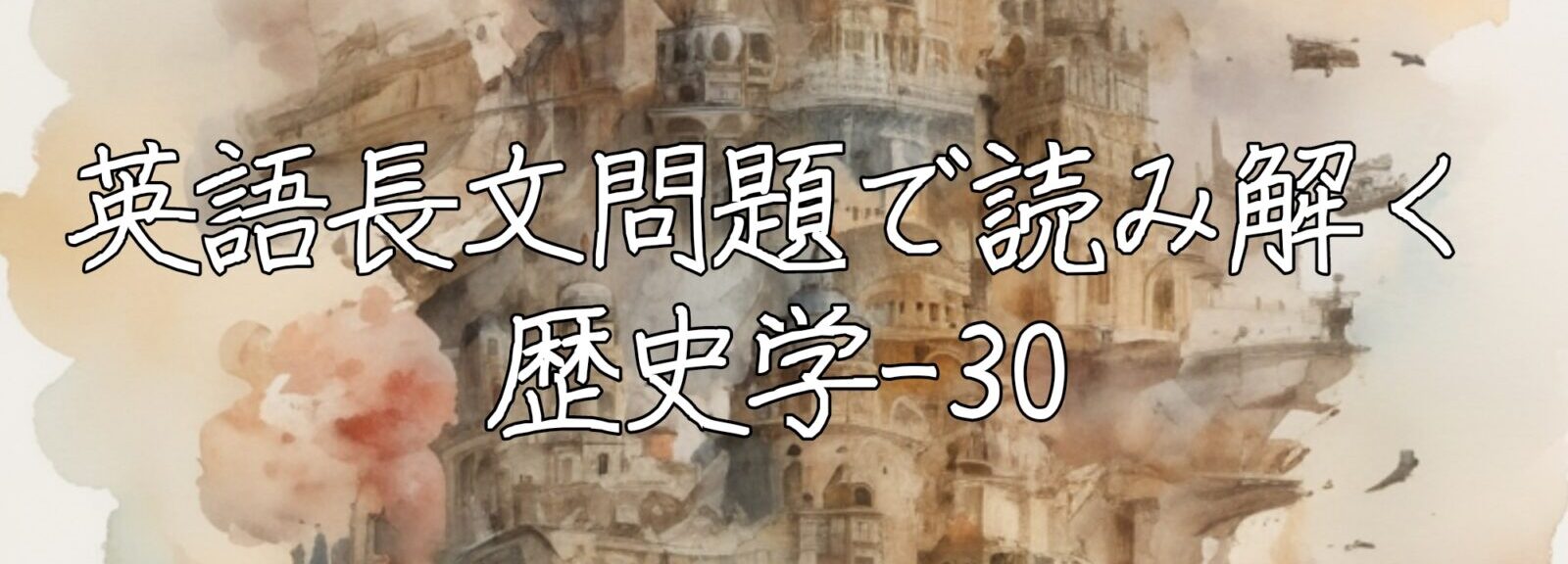英検2級レベルの英語長文問題を読み解きながら、歴史学の基本的な知識を身につけることが出来る問題集をkindleにて出版しました!
世界史の重要なテーマを活用して作成した問題集で、英語の勉強をしながら歴史を振り返ることができます。

英語長文問題で読み解く歴史学-30: 歴史学の重要テーマを英語で読み解く 英語長文問題で読み解く学問シリーズ
これまでに発売した英語の長文問題集の一覧はコチラから!
英語長文で読み解く歴史学-30 の中身を公開!
以下、どんな内容になっているのかを公開します!
目次
はじめに
1.歴史学 – 過去の出来事や人々を研究する学問。
2.古文書 – 古代の書物。
3.歴史解釈 – 歴史の解釈や書き方の研究。
4.年代学 – 出来事の年代を特定する学問。
5.歴史学的方法 – 歴史研究に用いられる手法。
6.帝国 – 多民族、多地域を支配する国家。
7.革命 – 社会や政治の急激な変革。
8.戦争 – 国家間や集団間の武力紛争。
9.植民地 – 他国によって支配される地域。
10.産業革命 – 工業化の進展による社会変革。
11.ルネサンス – 14世紀から16世紀にかけての文化的復興。
12.中世 – おおよそ5世紀から15世紀までの時代。
13.古代 – 古代文明の時代。
14.近代 – 近代以降の歴史。
15.大航海時代 – 15世紀から17世紀にかけての地理的探検。
16.封建制度 – 中世ヨーロッパにおける社会制度。
17.独立戦争 – 独立を目指して戦う戦争。
18.宗教改革 – 16世紀のキリスト教改革運動。
19.ナショナリズム – 国民国家の意識や主張。
20.古代ローマ – 古代ローマ文明。
21.古代ギリシャ – 古代ギリシャ文明。
22.冷戦 – 第二次世界大戦後の米ソ対立。
23.文化史 – 文化の歴史的発展。
24.経済史 – 経済の歴史。
25.政治史 – 政治の歴史。
26.科学技術史 – 科学技術の発展史。
27.革命史 – 革命の歴史。
28.労働史 – 労働と労働者の歴史。
29.法律史 – 法律と法制度の歴史。
30.環境史 – 環境と人間の相互関係の歴史。
1.歴史学 – 過去の出来事や人々を研究する学問。
The Tapestry of Time: Understanding the Nature and Importance of History
History is far more than a mere collection of dates and events from the past. It is a complex tapestry woven from the threads of human experiences, decisions, and their consequences. Understanding history is crucial for comprehending our present and shaping our future. This passage explores the nature of history, its importance, and how it influences our world today.
At its core, history is the study of change over time. It examines how societies, cultures, and individuals have evolved, interacted, and transformed throughout the ages. Historians analyze various sources, such as written documents, artifacts, and oral traditions, to piece together narratives of the past. These narratives help us understand the causes and effects of significant events, the development of ideas, and the patterns that have shaped human civilization.
One of the key aspects of history is its interpretative nature. Different historians may draw varying conclusions from the same set of facts, leading to ongoing debates and revisions of historical understanding. This dynamic quality of history ensures that our knowledge of the past is continually refined and expanded.
The importance of history cannot be overstated. It serves several crucial functions in our society. Firstly, history provides us with a sense of identity. By understanding our roots and the experiences of our ancestors, we gain insight into who we are as individuals and as members of various communities. For example, learning about the civil rights movement in the United States helps Americans understand the ongoing struggle for equality and the progress made over time.
Secondly, history offers valuable lessons that can guide decision-making in the present and future. By studying past successes and failures, we can learn from the experiences of others and avoid repeating mistakes. The study of economic depressions, for instance, has led to the development of policies aimed at preventing and mitigating similar crises in the future.
Furthermore, history cultivates critical thinking skills. As we examine historical events and interpret evidence, we learn to analyze information critically, consider multiple perspectives, and form well-reasoned arguments. These skills are invaluable in navigating the complex issues of our modern world.
History also helps us understand the context of current events and issues. Many of today’s global challenges, such as political conflicts or social inequalities, have roots in historical processes. By examining these historical contexts, we can better comprehend the complexities of contemporary problems and work towards effective solutions.
Moreover, history fosters empathy and cultural understanding. By learning about different cultures and societies throughout time, we develop a broader perspective and a greater appreciation for human diversity. This understanding is crucial in our increasingly interconnected world, promoting tolerance and cooperation across cultural boundaries.
In conclusion, history is not merely a subject to be studied in classrooms; it is a vital tool for understanding ourselves, our societies, and the world around us. By embracing the study of history, we equip ourselves with the knowledge and skills necessary to navigate the complexities of the present and shape a better future. As we continue to unravel the tapestry of time, we gain invaluable insights that enrich our lives and guide our collective journey forward.
注釈
- Tapestry (タペストリー): 織物、比喩的に「複雑に絡み合った物事」を意味する
- Artifact (人工遺物): 考古学的な発掘物や歴史的な物体
- Oral tradition (口承伝統): 世代を超えて口頭で伝えられる歴史や文化的な情報
- Interpretative (解釈的な): 解釈や分析を伴う
- Narrative (ナラティブ): 物語や説明的な記述
- Civil rights movement (公民権運動): 1950年代から60年代にかけてアメリカで起こった、人種差別撤廃を求める社会運動
- Mitigating (緩和する): 問題や困難な状況の影響を和らげること
- Critical thinking (批判的思考): 物事を客観的に分析し、評価する思考方法
- Contemporary (現代の): 現在の、同時代の
- Empathy (共感): 他者の感情や経験を理解し、共感する能力
設問
- According to the passage, what is the primary focus of history?
a) Memorizing dates and events
b) Studying change over time
c) Predicting the future
d) Collecting artifacts - Which of the following is NOT mentioned as a source used by historians to study the past?
a) Written documents
b) Artifacts
c) Oral traditions
d) Scientific experiments - Why does the passage describe history as having a “dynamic quality”?
a) Because historical events are constantly changing
b) Because new historical events occur every day
c) Because historical interpretations are subject to debate and revision
d) Because history books are frequently updated - How does the study of history contribute to personal and collective identity?
a) By providing entertainment through historical stories
b) By offering insights into ancestral experiences and roots
c) By predicting future identities
d) By erasing cultural differences - What example does the passage use to illustrate how history can guide future decision-making?
a) The civil rights movement
b) The study of economic depressions
c) The development of critical thinking skills
d) The analysis of political conflicts - According to the passage, how does studying history cultivate critical thinking skills?
a) By memorizing important dates and facts
b) By analyzing information and considering multiple perspectives
c) By focusing solely on one’s own cultural history
d) By avoiding controversial historical topics - How does the passage suggest history helps in understanding current events?
a) By predicting future events accurately
b) By providing entertainment value
c) By examining the historical roots of contemporary issues
d) By ignoring the past completely - Which of the following is NOT mentioned as a function of history in the passage?
a) Providing a sense of identity
b) Offering lessons for decision-making
c) Fostering empathy and cultural understanding
d) Entertaining people with interesting stories - According to the passage, how does history promote tolerance and cooperation?
a) By focusing only on one’s own culture
b) By ignoring cultural differences
c) By developing appreciation for human diversity
d) By promoting cultural superiority - What is the main conclusion of the passage regarding the importance of history?
a) History is only useful for academic purposes
b) History is a vital tool for understanding ourselves and the world
c) History is primarily important for predicting the future
d) History is less relevant in the modern world
解答・解説
- 本文によると、歴史の主な焦点は何ですか?
a) 日付と出来事を暗記すること
b) 時間の経過に伴う変化を研究すること
c) 未来を予測すること
d) 人工遺物を収集すること
答え:b) 時間の経過に伴う変化を研究すること
説明:本文では、「歴史の核心は、時間の経過に伴う変化の研究である」と明確に述べられています。歴史は単なる日付や出来事の暗記ではなく、社会や文化、個人がどのように進化し、相互作用し、変化してきたかを研究することに重点を置いています。
- 以下のうち、歴史家が過去を研究するために使用する情報源として本文で言及されていないものはどれですか?
a) 書かれた文書
b) 人工遺物
c) 口承伝統
d) 科学的実験
答え:d) 科学的実験
説明:本文では、歴史家が使用する情報源として「書かれた文書、人工遺物、口承伝統」が具体的に挙げられています。科学的実験については言及されていません。
- なぜ本文では歴史を「動的な性質」を持つものとして描写していますか?
a) 歴史的出来事が常に変化しているため
b) 新しい歴史的出来事が毎日起こるため
c) 歴史的解釈が議論や改訂の対象となるため
d) 歴史の教科書が頻繁に更新されるため
答え:c) 歴史的解釈が議論や改訂の対象となるため
説明:本文では、異なる歴史家が同じ事実から異なる結論を導き出す可能性があり、これが継続的な議論や歴史的理解の改訂につながると説明されています。この特性が歴史の「動的な性質」を形成しています。
- 歴史の研究は、個人的および集団的アイデンティティにどのように貢献しますか?
a) 歴史的な物語を通じてエンターテインメントを提供することで
b) 祖先の経験やルーツについての洞察を提供することで
c) 未来のアイデンティティを予測することで
d) 文化の違いを消去することで
答え:b) 祖先の経験やルーツについての洞察を提供することで
説明:本文では、歴史が私たちのルーツや祖先の経験を理解することを通じて、個人やコミュニティのメンバーとしての自己認識を深める役割を果たすと説明されています。
- 本文では、歴史が将来の意思決定をどのように導くかを説明するためにどの例を使用していますか?
a) 公民権運動
b) 経済恐慌の研究
c) 批判的思考スキルの発達
d) 政治的紛争の分析
答え:b) 経済恐慌の研究
説明:本文では、経済恐慌の研究が将来の同様の危機を防止し緩和するための政策開発につながった例として挙げられています。これは、過去の経験から学び、将来の意思決定に活かす歴史の役割を示しています。
と、このような感じで、30問の長文問題が一冊にまとまっております!
歴史学の重要テーマ、30問あります!
目次にもあるように、30個の歴史学にまつわる重要テーマやキーワードを使い、長文問題を作りました。
英語力を向上させたい、かつ、歴史学の知識を得たい人にとって、最適な長文問題集となっております。
英語レベルは英検2級を目指している人にとって丁度いい塩梅。
経済史や、環境史など、ジャンルごとにまとめた歴史も扱っているので、英語の長文問題を解くことで多角的に今を取り巻く世界を考察することができます。
タイパを重視して、歴史学の知識を得つつ、英語の読解力を向上させたい人は、ぜひ活用してみてください。

英語長文問題で読み解く歴史学-30: 歴史学の重要テーマを英語で読み解く 英語長文問題で読み解く学問シリーズ
これまでに発売した英語の長文問題集の一覧はコチラから!
#歴史学 #世界史 #英語 #英語学習 #英語長文問題集 #英検対策 #TOEFL対策 #英語勉強







コメント